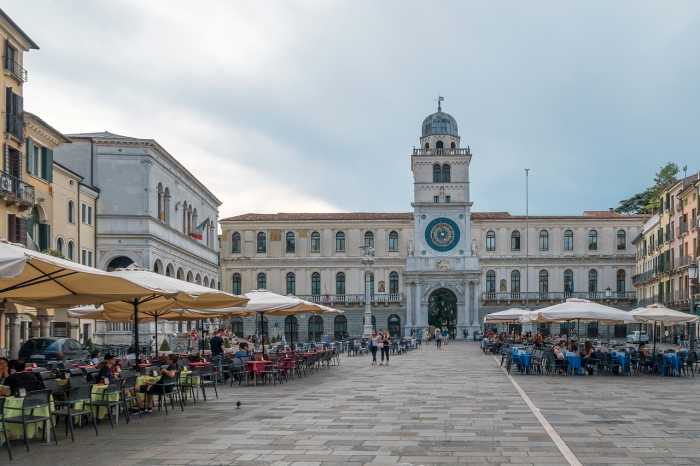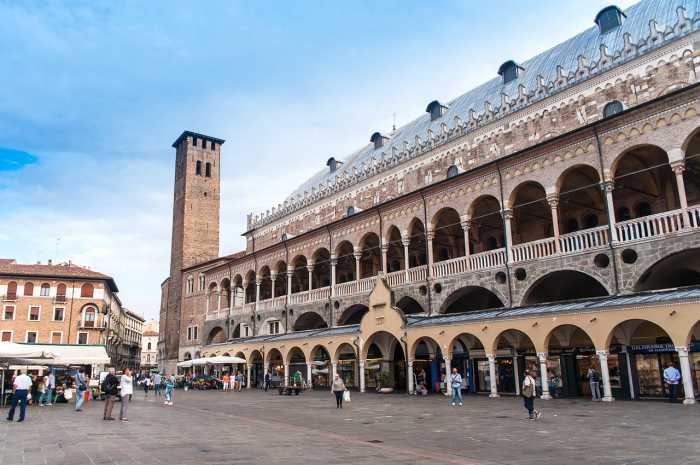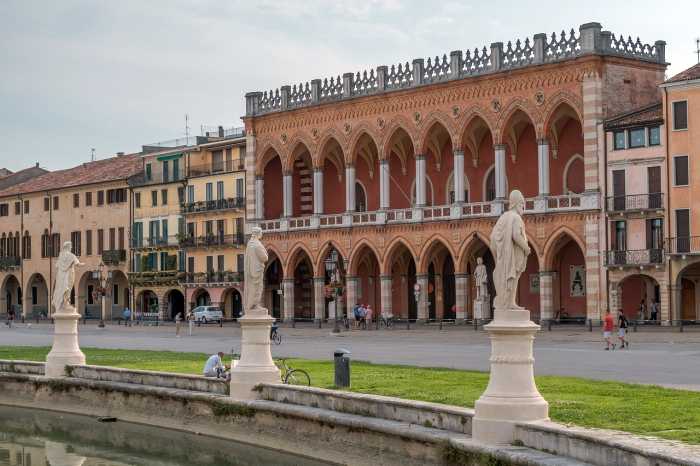
Piazza dei Signori
Padua is located in the Northeastern region of Veneto on the Bacchiglione River, approximately 25 miles west of Venice. It is one of the oldest cities in Northern Italy as its first settlement goes back to about 1,200 BC. During the Middle Ages and Renaissance, Padua acquired additional importance by becoming the seat of one of the oldest universities in the world, founded in 1222 (the 2nd oldest in Italy after the one in Bologna founded in 1,088). The 13th century is also the period when the first Jews settled in Padua. Many Jews who had been persecuted and expelled from Germany, France and other European countries moved to Padua since the local population was tolerant and the Jews were admitted without restrictions. Unfortunately, this changed for the worse in 1405 when the city fell under the power of the Republic of Venice. Nevertheless, Jews were still allowed to study at the city’s prestigious university, although they had to pay higher fees than the Christian students. Padua also became an important hub for Jewish studies, and throughout the ages many important rabbis and scholars lived in Padua.
The Jewish Ghetto
The creation of the ghetto dates back to 1603, 90 years after the first world ghetto was built in 1513 in Venice. It was built near the beautiful Piazza delle Erbe, “Square of the herbs”, one of the main attractions in Padua in the old part of town, where the market still exists today. The area was chosen because it was already densely populated with Jewish families and because many of their shops and two synagogues were located there. Guarded doorways separated the ghetto from the rest of the city at night, since Jews were only allowed to leave during the day, when they had to present a “Jewish sign” (a coloured piece of fabric on their clothes, or a particular kind of hat). Since the area of the ghetto, like in any other city where ghettos were established, was quite cramped, building spaces had to be developed vertically, such as the “Casa torre” (“Tower house”) in Via dell’Arco.

Palazzo della Ragione
The Jewish segregation ended with the arrival of the Napoleonic French troops in 1797 and was not reinstated when the city fell under the rule of the Austro-Hungarian Empire. Full equality was achieved in 1866, when Padua was finally annexed by the Kingdom of Italy. The hub of the Ghetto used to be the “Scola Todesca” (the Ashkenazi Synagogue) which has hosted the local Jewish Museum since 2015. Because of its central location this has become the starting point of all tours of Jewish Padua and from where I also started my tour of the city.
After a visit to the old “Scola tedesca”, now museum, I walked down the small and winding roads of the old Ghetto, where the Italian synagogue is located. As all synagogues in old ghettos, the exteriors are very plain and unassuming, however the interiors are richly adorned. Furthermore, I recommend a visit to the two surviving cemeteries out of the seven that there once were. Here are buried Hachamim such as Rabbi Meir Katzenellenbogen (Prague 1482 – Padua 1565) known as the MaHaRam, Don Itzchaq Abravanel and Rabbi Samuel David Luzzato, the SHaDal (1800-1865).
In the footsteps of Galileo
In the footsteps of Galileo
I continued my visit following the footsteps of Galileo: I booked a guide for the Padua university where Galileo taught for several years. You enter into a world of ancient knowledge where countless scientific discoveries were made by him and other fellow scholars throughout the ages within these very walls and by the very desk where Galilei taught in 1600. Also within the University compound is the world’s oldest academic botanical garden where you can enjoy an incredible combo of history and nature.

Prato della Valle

Prato della Valle
I continued my stroll through the beautiful old city until the huge Prato della Valle (Valley Meadow), the largest piazza in Italy, always bustling with locals enjoying an afternoon stroll or letting their kids run around in the sunshine. Regular events and markets also take place in the piazza.
I decided it was about time for me to recharge my batteries at the Pasticceria Graziani, one of the oldest pastry shops in Italy active since 1919. I enjoyed a roasted Italian espresso made with Graziani’s “secret” coffee blend while sitting outdoor “al fresco” in the beautiful old Padua setting.
After this tasty and relaxing pause, I continued strolling through the pleasant and elegant old city enjoying its typical atmosphere, pausing for some window shopping, and actual shopping too, and taking my time to appreciate the small details of the surroundings.
Andrea Alcalay from La Tour I-Talya. LaTour I-Talya is a project established and managed by a team of Italian Jews working together with one of the largest and most prestigious Italian Tour Operators. LaTour I-Talya specializes in tour packages which focus on the amazingly rich Jewish historical and cultural heritage found throughout Italy.
Read more articles from our Hidden Gems of Italy series:
Echoes of the Past: Unraveling Trieste's Jewish Legacy
A Walk Through History: Exploring Ferrara's Jewish Heritage
Beyond Rome: The Enchanting Villages of Anagni and Alatri
Explore the Charm of Casate Monferrato
Get in Touch with the oldest Jewish community in Tuscany
The Jewish beauty of Florence
Mantua: First stop in the Renaissance cities of Northern Italy
Pitigliano: "Little Jerusalem" in the Tuscan Maremma Region
Cividale del Friuli: Jewish Tours of Italy off the Beaten Path
The Marche Region: Undiscovered area of Central Italy
Andrea Alcalay from La Tour I-Talya. LaTour I-Talya is a project established and managed by a team of Italian Jews working together with one of the largest and most prestigious Italian Tour Operators. LaTour I-Talya specializes in tour packages which focus on the amazingly rich Jewish historical and cultural heritage found throughout Italy.
Read more articles from our Hidden Gems of Italy series:
Echoes of the Past: Unraveling Trieste's Jewish Legacy
A Walk Through History: Exploring Ferrara's Jewish Heritage
Beyond Rome: The Enchanting Villages of Anagni and Alatri
Explore the Charm of Casate Monferrato
Get in Touch with the oldest Jewish community in Tuscany
The Jewish beauty of Florence
Mantua: First stop in the Renaissance cities of Northern Italy
Pitigliano: "Little Jerusalem" in the Tuscan Maremma Region
Cividale del Friuli: Jewish Tours of Italy off the Beaten Path
The Marche Region: Undiscovered area of Central Italy